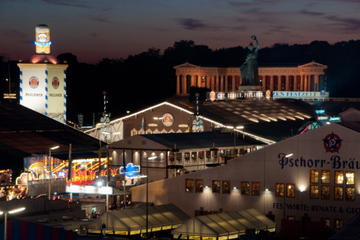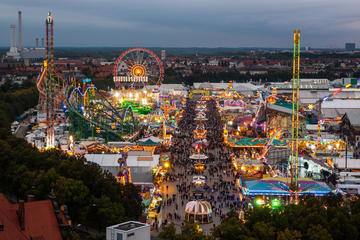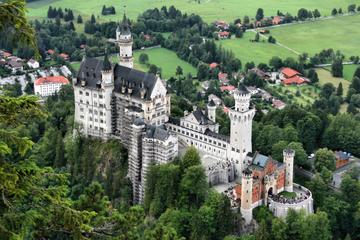Munich History
Munich was the site of a small settlement of Bendictine monks established in the 8th Century. In the 12th Century, the salt trade crossed the Isar River a few miles downstream at a toll bridge run by Bishop Otto von Freising. Guelph Heinrich der Lowe (Duke Henry the Lion) burnt down the bridge and built his own so that he could earn the proceeds of the toll instead of Bishop Otto. Duke Henry founded Munich as a trading center on the other side of the bridge. By 1180 when Duke Henry was banished from Bavaria, the city’s fortifications enclosed 2500 people and the Marienplatz, which served as a grain market. By that time, Munich had become an important establishment in the salt route and grain trade and Bishop Otto could not retake control of it.
Otto von Wittelsbach became the ruler of Bavaria following Henry the Lion. Munich grew quickly during this prosperous time. In 1314, after Duke Ludwig IV (later known as Ludwig the Bavarian) was elected German kaiser, Munich was thrust into prominence in German politics. Frederick the Handsome of the Hapsburg family attacked Munich unsucessfully in 1319. But the pope sided with Hapsburg and excommunicated Ludwig. When Ludwig the Bavarian was killed accidentally while hunting bear in 1346, Munich’s reign as leader of Germany may have ended but its growth did not. Trade with Italy expanded and Ratstrum, the Altes Rathaus, the Frauenkirche, and Alter Peter were constructed. By the start of the 16th Century, 14,000 people called Munich home.
Munich adopted the Bavarian Purity Law in 1516. It was the first law to regulate food or beverage production in Europe. The Reinheitsgebot declared that barley, hops and water were the only ingredients that could be used for brewing beer. But purity of beer may have had little to do with enacting it. Rather, the government may have been trying to keep bread cheap and ease food scarcity by decreasing competition for grains. Following World War II, as Germany struggled, the idea of marketing beer purity to America’s rising craft beer drinkers made sense.
Munich blossomed during the Renaissance as a cultural center. But in 1632, the Thirty Years’ War came to Munich, and it surrendered to the King of Sweden almost immediately. The Black Plague also struck Munich, killing one third of its population. The Mariensaule was constructed on the Marienplatz by Maximilian I to thank God for sparing the city from destruction.
The rise of Napoleon would greatly expand the territory of Bavaria, as he occupied Munich, created a new Bavarian nation doubling its territory, and personally conducted the coronation of Max IV Joesph as King Maximilian I. In 1810, the city celebrated its first Oktoberfest at the marriage of Crown Prince Ludwig (later, Ludwig I), the new King’s son. We’ve detailed the history of Oktoberfest extensively elsewhere and won’t repeat it here.
By the 19th Century, Munich was one of the largest cities in Europe. It had a population of 100,000 in 1846 and 500,000 in 1901. During this time, Munich would serve as an important center of art and science and benefit from the Industrial Revolution. In 1871, Bavaria under Ludwig II lost its independent status as part of the unification of Germany by Bismarck. Its role as a leading economy and center for the arts continued, however.
Munich suffered during World War I due to the Allied blockade of Germany. With food and fuel in short supply, discontent grew. The Wittelsbach family would rule Munich (with a few minor breaks) from the 13th Century until the end of World War I when they fled in the face of revolution. Socialism and Communism followed in Munich. Where the foundations for the rise of Adolf Hitler and the Nazi Party, who were involved in Bavarian politics, were laid.
World War II was costly for Munich. Half of the city’s buildings were destroyed by Allied bombing and a quarter million citizens died. But Munich rebuilt. Buildings were restored to their original appearance and Munich returned to its status as a leading center of economic growth in Europe. BMW and Siemens call Munich home. The 1972 Summer Olympic Games were held in Munich, although they are probably best known for the tragic terrorist attack against Israeli athletes.
Enjoy Oktoberfest in Munich
7 Day Munich Oktoberfest Package
$5,376.35
Oktoberfest Tour and Beer Tent
$136.59
Castle Day Tour From Munich
$59.01
Additional Information:
History of Oktoberfest
Bavarian Purity Law
Oktoberfest Facts
Oktoberfest Home




